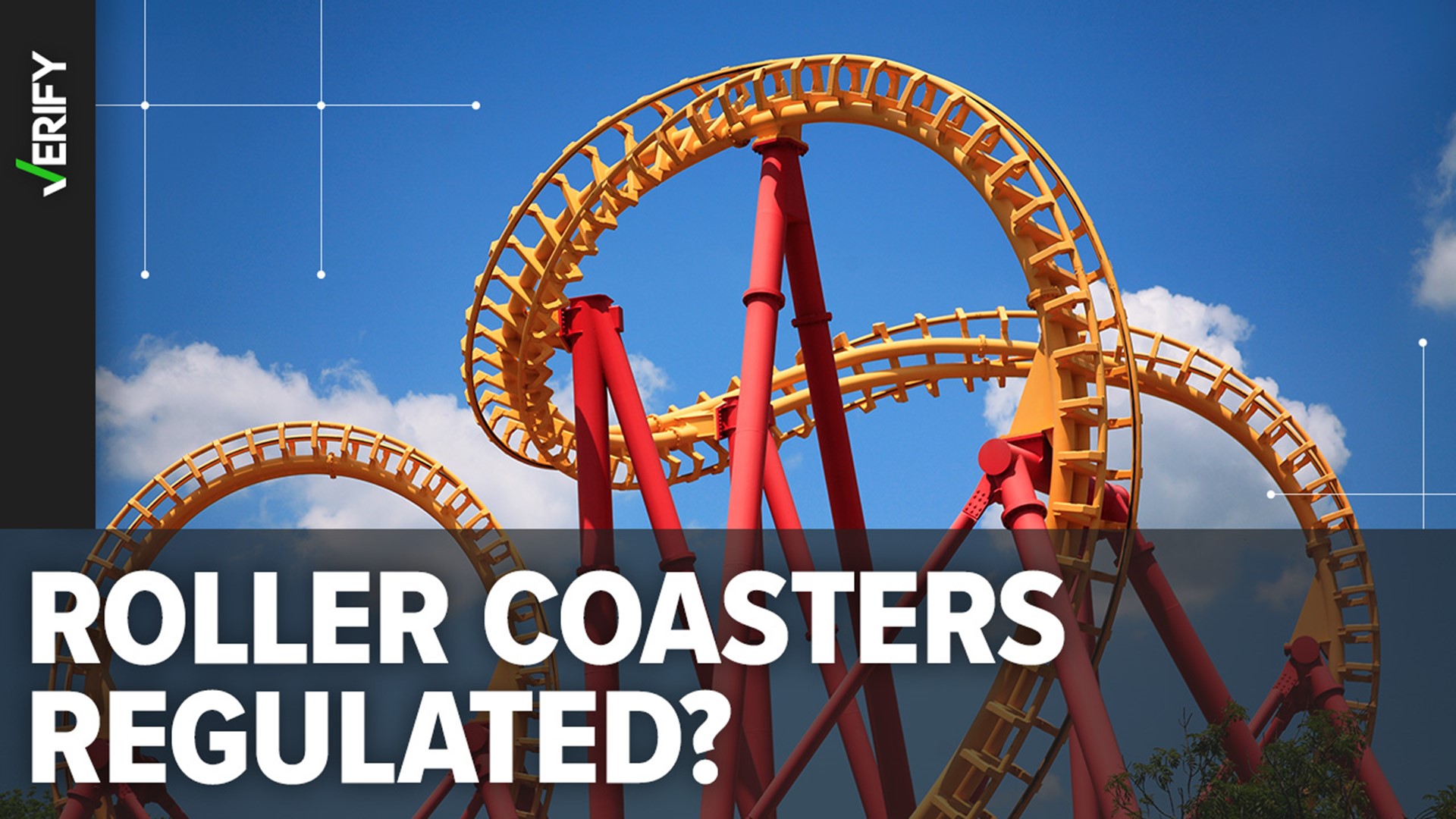On June 30, Fury 325, one of the most popular roller coasters at Carowinds amusement park in Charlotte, North Carolina, was shut down after a crack was found in a support beam. Two days later, a roller coaster at a festival in Crandon, Wisconsin, malfunctioned, leaving passengers on the coaster upside down for several hours.
After the two incidents, people on social media began contemplating the safety of roller coasters, and questions about roller coaster regulations became popular in Google searches.
THE QUESTION
Are roller coasters federally regulated?
THE SOURCES
International Association of Amusement Parks and Attractions (IAAPA)
Amusement Ride Injury Lawyer, a Connecticut-based law firm that handles cases related to amusement park injuries nationwide
American National Standards Institute (ANSI), administrator and coordinator of the U.S. private sector voluntary standardization system
Saferparks, a non-profit organization founded to help prevent amusement ride accidents
Carolyn McLean, a consultant and public relations strategist with the amusement park industry
THE ANSWER
No, roller coasters aren’t federally regulated. But authorities in most states oversee the safety of rides located in permanent, fixed amusement parks.
WHAT WE FOUND
There are no federal regulations on amusement parks or fixed-site rides like roller coasters, the International Association of Amusement Parks and Attractions (IAAPA) says. However, 44 of 50 U.S. states do regulate parks and their rides.
“There is no federal agency or laws that are in place to oversee the parks and rides, and the federal government gives each state the discretion on regulating its parks,” says Amusement Ride Injury Lawyer, a Connecticut-based law firm that handles cases related to amusement park injuries nationwide. “Some states may have government oversight, partial government oversight, regulations only on inspections, or no regulation agencies.”
The six states with no state regulatory oversight are Alabama, Mississippi, Montana, Nevada, Wyoming and Utah, IAAPA says, although Saferparks, a non-profit organization founded to help prevent amusement ride accidents, notes that Utah requires rides be inspected each year by a private-sector inspector. Those six states contain 37 of the nation’s 892 operating roller coasters, according to the Roller Coaster Database.
Many amusement parks also choose to follow the “Standard for Amusement Ride Design” created by the American National Standards Institute (ANSI), which establishes voluntary standards for private industries. Many states also use these standards in their own regulations, ANSI says. Saferparks, a non-profit organization founded to help prevent amusement ride accidents, says 35 states reference these standards in their regulations.
Fixed-site amusement rides typically undergo a “thorough set of internal mechanical, electrical, design, and operational safety checks and standards,” the IAAPA says. These rides are subject to independent examination by one or more officials from the state government, local government, insurance companies and/or private safety firms.
According to Carolyn McLean, a consultant and public relations strategist with the amusement park industry, park operators inspect all rides daily, before opening the park to the public. State regulators typically come and inspect the rides just before the park opens for a new season each year, and a third-party private security firm will sometimes come to the park to perform random audits.
Each roller coaster comes with its own manual and manufacturer’s guidelines, McLean says.
“It's the park's responsibility to open that up and know every word backwards and forwards so that every single day when they do their daily operations before the park opens to park guests, the T's have been crossed, the I’s have been dotted and that manual is being followed to a tee,” McLean said.
The U.S. Consumer Product Safety Commission (CPSC) is authorized to investigate accidents and work with manufacturers to correct defects and hazards in movable roller coasters and amusement rides, such as those at carnivals, Amusement Ride Injury Lawyer and Saferparks say. Saferparks data says 46 states regulate carnival rides.
The CPSC does not have any oversight over permanent amusement park rides. And while the CPSC can investigate accidents on movable rides, there are no mandatory federal standards for amusement rides of any kind, according to the CPSC.

